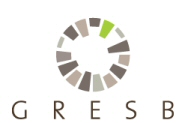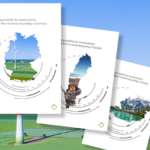Of the 30 companies in the motor vehicles and parts sector whose environmental and sustainability reporting was analyzed by the Roberts Environmental Center in 2006, General Motors (U. S.) again achieved the highest ranking in environmental and sustainability reporting based on the Center’s Pacific Sustainability Index. Volkswagen (Germany) leapfrogged Ford (U.S.), Toyota (Japan), BMW (Germany), and DaimlerChrysler to achieve second place. Denso (Japan) moved up from tenth place in 2005 to fourth place, the highest score in the parts section of the sector, with a grade of A; Johnson Controls (U. S.), the next highest scoring firm in the parts sector, achieved a respectable B. The lowest scores, a result of failure to post more than a minimal amount of company-specific environmental or social information on their web sites, went to Lear (U. S.), Magna International (Canada), and Koc Holding (Turkey), all with grades of D-.
There is a moderate positive relationship between company size and quality of reporting, driven both by the low scores of the smallest companies in our sample and by the high scores of three of the largest players. Almost the full range of scores was seen in firms with revenues around $24 billion, with Denso much higher than average for its size. The smallest firm in the sector, the Man Group (Germany) obtained a slightly better than average C+.
All materials were scored using the Center’s Pacific Sustainability Index which also provides scores for six subcategories of reporting. The highest scores for these went to VW for expressed environmental intent, Denso for environmental reporting transparency, Toyota for quantitative environmental performance, GM for expressed social intent, VW for social reporting transparency, and VW for quantitative social performance.
In this sector the most reported environmental variables were energy use, waste recycled, product performance, and water use. The most reported social information was employee health and safety, community education and development, and consumer health and safety.
These findings are based on the information available on the web sites of the largest 30 companies in the motor vehicles and parts sector of the 2005 Fortune Global 500 and Fortune 1000 lists as of February 28, 2006. All firms were invited to review and comment on the analysis prior to publication, and many brought to our attention relevant information, unlinked, unreferenced, or otherwise "hidden" on their web sites that raised their scores. Better web site navigation tools for environmental and sustainability information are clearly needed on many sites.
During the summer, the Roberts Environmental Center web site has added many new features which will be announced in the fall but may presently be viewed in beta mode.



